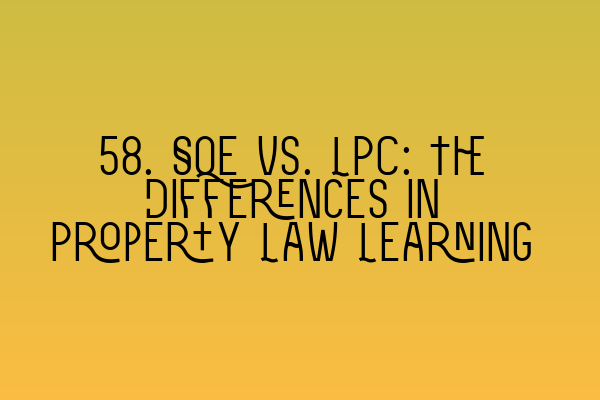58. SQE vs. LPC: The Differences in Property Law Learning
Are you considering a career in property law? Perhaps you’re already a law student, or maybe you’re thinking about a career change. Either way, it’s essential to understand the different pathways available to you. In this blog post, we will explore the differences between the Solicitors Qualifying Exam (SQE) and the Legal Practice Course (LPC) when it comes to learning property law.
The SQE, introduced in 2021 by the Solicitors Regulation Authority (SRA), is a new route to qualification as a solicitor in England and Wales. It replaces the traditional LPC route and aims to provide a more flexible and accessible way for aspiring solicitors to gain the necessary knowledge and skills. So, how does the SQE compare to the LPC in terms of property law learning?
1. Structure and Format
The LPC is typically taken after completing the academic stage of legal education, usually a law degree or a conversion course like the Graduate Diploma in Law (GDL). The course is usually one year full-time or two years part-time and is offered by various institutions across the country.
On the other hand, the SQE is a two-part examination series that can be taken after completing a law degree or an equivalent qualification. The SQE Part 1 consists of multiple-choice questions (MCQs) and is designed to test your knowledge of the core areas of law, including property law. The SQE Part 2 focuses on practical skills, including client interviewing, advocacy, and legal research.
2. Property Law Learning
When it comes to property law, both the LPC and the SQE cover the essential aspects of the subject. However, there may be some differences in the depth and breadth of the material covered.
The LPC typically includes dedicated property law modules, where students learn about topics such as land law, landlord and tenant law, conveyancing, and leases. These modules provide a comprehensive overview of the subject, preparing students for practice in the field of property law.
In contrast, the SQE integrates property law within the broader context of the core areas of law. Property law topics are included in the MCQs of the SQE Part 1, ensuring that candidates have a solid understanding of the subject. Additionally, the SQE Part 2 assesses practical skills, which may include property law-related tasks.
3. Practice and Preparation
To succeed in property law, practical experience is crucial. Both the LPC and the SQE recognize this and provide opportunities for practical learning.
The LPC often integrates practical elements, such as skills workshops and simulated transactions, to give students a taste of real-world property law practice. Students may also have the opportunity to undertake a work placement or a pro bono assignment in a property law setting.
Similarly, the SQE Part 2 focuses on assessing practical skills, including property law-related tasks. Candidates must demonstrate their ability to apply legal principles to real-life scenarios.
To help you prepare for the SQE, it’s essential to access resources and support tailored to the new assessment format. Websites like SQE Law Prep offer valuable practice exam questions and mock exams for both SQE Part 1 and Part 2. These resources can aid in familiarizing yourself with the question format and testing your knowledge and skills. For additional preparation, SQE 1 and SQE 2 preparation courses are available to help you bolster your understanding and refine your approach to property law.
4. Flexibility and Cost
One significant advantage of the SQE over the traditional LPC route is its flexibility. With the SQE, you have the freedom to choose when and how you study. You can opt for self-study or choose from a variety of available courses to suit your needs and schedule. This flexibility allows you to balance your professional and personal commitments while pursuing your qualifying exams.
Additionally, the cost of qualifying through the SQE may be more affordable for some individuals. While the LPC can be quite expensive, especially when considering tuition fees and living expenses, the SQE offers opportunities for more cost-effective preparation and specialization in specific areas of law like property law.
In conclusion, both the SQE and LPC pathways provide comprehensive learning experiences in property law. The LPC offers dedicated modules and practical opportunities, while the SQE integrates property law within the broader context of the core areas of law. Choosing the right path depends on your individual circumstances, preferred learning style, and career aspirations.
If you’re interested in property law, ensure you stay up-to-date with the latest SRA SQE exam dates and take advantage of resources like SQE 1 practice exam questions and SQE 2 preparation courses. By preparing effectively for the SQE, you can confidently embark on your journey towards becoming a qualified property lawyer.
To learn more about the SQE and its requirements, visit SQE Law Prep to access valuable resources and course offerings. Good luck on your property law learning journey!
Related Articles:
– SQE 1 Practice Exam Questions
– SQE 1 Practice Mocks FLK1 FLK2
– SQE 2 Preparation Courses
– SQE 1 Preparation Courses
– SRA SQE Exam Dates
